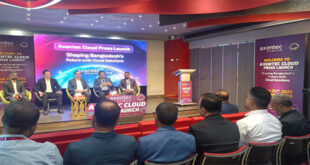Bangladeshi-born Bengali American data scientist, Dr. Rumman Chowdhury, has earned a well-deserved spot on the esteemed TIME 100 AI list. This incredible accolade acknowledges her remarkable impact in the world of Artificial Intelligence (AI). Dr. Chowdhury is a prominent figure in the field of applied algorithmic ethics. By combining data science and social science, he explores the ethical issues surrounding AI and machine learning technologies.
Dr. Chowdhury, born in 1980 in Rockland County, New York, found herself captivated by science fiction and the “Dana Scully Effect” during her early years. This fascination propelled her unwavering curiosity towards the world of science. She finished her bachelor’s degrees in Management Science and Political Science at the Massachusetts Institute of Technology. Then, she obtained a Master’s degree in Statistics and Quantitative Methods from Columbia University. Dr. Chowdhury obtained her Doctorate in Political Science from the University of California, San Diego, all while successfully navigating the fast-paced environment of Silicon Valley.
She has dedicated her academic pursuits to comprehending the ways in which data can be leveraged to identify human biases and assess the influence of technology on society. She assumed the position of Director of Engineering for Twitter’s Machine Learning Ethics, Transparency, and Accountability (META) team from February 2021 until November 2022. Throughout her time in office, she worked tirelessly to harmonize Twitter’s AI algorithms with ethical standards, guaranteeing a more conscientious and open technological environment.
Dr. Chowdhury played a pivotal role in organizing a revolutionary event in Las Vegas, which successfully gathered around 4,000 hackers in early August. Participants were challenged to uncover vulnerabilities in chatbots created by OpenAI, Google, and Anthropic during the event. Hackers were given points for their ability to convince AI systems to violate their own rules, either by disclosing confidential information or promoting harmful content. The exercise served as more than just a competition; it provided a thorough exploration of the ethical limits and possible drawbacks of AI technologies.
The event underscored the urgency of Dr. Chowdhury’s work. As AI systems become increasingly integrated into our daily lives, the ethical considerations surrounding their use grow ever more complex.
Dr. Chowdhury’s efforts to scrutinise and improve these technologies reflect a broader movement to ensure that AI serves the public good, rather than exacerbating existing societal issues.
 InfoSecBulletin Cybersecurity for mankind
InfoSecBulletin Cybersecurity for mankind














